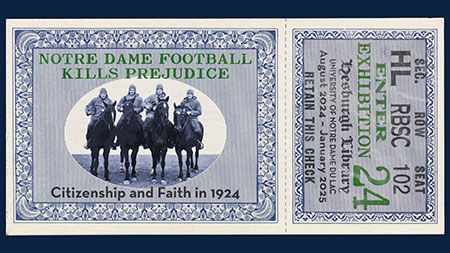102 Hesburgh Library, Rare Books & Special Collections
“Notre Dame football is a new crusade: it kills prejudice and stimulates faith.”
— Rev. John F. O’Hara, C.S.C., Prefect of Religion, Religious Bulletin, November 17, 1924
The 1924 undefeated University of Notre Dame football team beat the best opponents from all regions of the country and won the Rose Bowl to claim a consensus national championship. Off the field, Notre Dame battled an intense reactionary nativist political environment that, in its most extreme manifestation, birthed the second version of the Ku Klux Klan. The “100% Americanism” political movement of the Klan and of fellow nativist sympathizers celebrated white, male, Protestant citizenship and denigrated or attacked groups—including Catholics and immigrants—who challenged their restrictive understanding of American identity.
The “Fighting Irish” football success, cemented in national memory by Grantland Rice’s “Four Horsemen” column, came during this dangerous and divisive political moment. Notre Dame leaders responded by consciously harnessing the unprecedented popularity and visibility of the 1924 national champion football team to refute surging reactionary nativism and to promote—within the very real political constraints of the era—a more inclusive and welcoming standard of citizenship.
Notre Dame capitalized on new technologies, networks of supporters, and the acceptance of major mainstream American institutions to embrace the national stage on its own terms and to counter contemporary exclusionary politics. The spectacular success of the Fighting Irish football team belied the arguments of “100% Americanism.” Notre Dame embraced its identity while indisputably rising to the top of college football—one of the most popular athletic pastimes in the United States and a key cultural production of the American political, social, and cultural elite.
This exhibit features correspondence, publications, photographs, artifacts, and other material from the University of Notre Dame Archives and beyond. It tells the story of how the 1924 national football champion Fighting Irish leveraged their popularity and gridiron success to discredit nativist “100% Americanism” politics and to stake the claim of Notre Dame—and Catholics and immigrants—to full citizenship and undisputed Americanness.
Read more about the exhibit in our news story.
Meet the Curators
Curators Gregory Bond and Elizabeth Hogan will host open houses from 3 - 4:30 pm, with remarks beginning at 3:15 on the following Fridays:
- Nov. 15
This exhibit is curated by Gregory Bond, Curator of the Joyce Sports Research Collection, and Elizabeth Hogan, Senior Archivist for Photographs and Graphic Materials. This and other exhibits within the Hesburgh Libraries are generously supported by the McBrien Special Collections Endowment.
All exhibits are free and open to the public during business hours.

